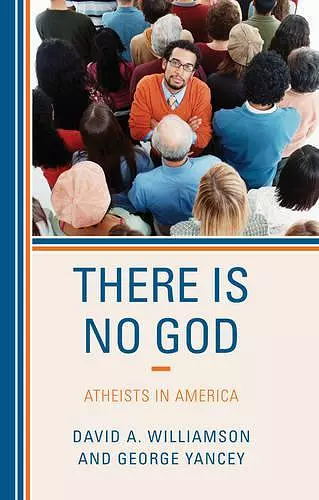There Is No God
Atheists in America
David A Williamson author George Yancey author
Format:Hardback
Publisher:Rowman & Littlefield
Published:4th Apr '13
Currently unavailable, and unfortunately no date known when it will be back

There Is No God: Atheists in America answers several questions pertaining to how the atheist population has grown from relatively small numbers to have a disproportionately large impact on important issues of our day, such as the separation of church and state, abortion, gay marriage, and public school curricula. Williamson and Yancey answer the common questions surrounding atheism. Just how common is the dismissal and derision of religion expressed by atheists? How are we to understand the world view of atheists and their motivations in political action and public discourse? Finally, is there any hope for rapprochement in the relationship of atheism and theism? In There Is No God, the authors begin with a brief history of atheism to set the stage for a better understanding of contemporary American atheism. They then explore how the relationship between religious and atheistic ideologies has evolved as each attempted to discredit the other in different ways at different times and under very different social and political circumstances. Although atheists are a relatively small minority, atheists appear to be growing in number and in their willingness to be identified as atheists and to voice their non-belief. As those voices of atheism increase it is essential that we understand how and why those who are defined by such a simple term as “non-believers in the existence of God” should have such social and political influence. The authors successfully answer the broader question of the apparent polarization of the religious and non-religious dimensions of American society.
Williamson and Yancey, both sociologists at the University of North Texas, conducted an empirical study of people who call themselves atheists. This is a considerably smaller group than the 5 percent of Americans who say they do not believe in God. Since there are too few professed atheists to pick up in normal probability surveys, the authors conducted an online survey of about 1,400 members of atheist organizations and face-to-face interviews with 50 atheists, half in the Bible Belt and half in an unidentified 'progressive Midwestern college town.' Most of the atheists were educated, older, white men from weakly religious backgrounds. What seems to have pushed them into an explicitly atheist identity is their opposition to the political activity of the Christian Right. The atheists instead proposed a social ethic made of equal parts science, rationalism, and progressive politics. The authors are undecided whether there are actually significantly more atheists now, or whether social media—and political provocation—have led more of them to publicly proclaim their position. A solid empirical study that will be the best basis for future research. Summing Up: Recommended. All academic levels/libraries. * CHOICE *
Williamson and Yancey define atheism as the affirmative belief that no god or supernatural power exists. Atheists, therefore, share something in common with those who embrace religion. Their worldview is equally a matter of faith or belief. Quite remarkable, then, is the venom and vitriol found in contemporary antireligious polemics, especially by those desiring a society that is inclusive, diverse, and respectful of differences. The authors have undertaken a historical and sociological analysis of atheists, not only to better understand this vocal minority but also to examine the nature of the conflict with religion. They conclude it’s more political than metaphysical. Extreme atheism seeks to eliminate religion from the public square and subvert its perceived authority for drawing social and moral boundaries. If history is full of examples of the destructive excesses and intolerance of religion, an acerbic atheism, an atheism without altruism, scarcely seems an acceptable alternative. The authors’ dispassionate and helpful analysis of extreme atheism also demonstrates that compassion and compromise come from the center. * Booklist *
This study puts into context the historical conditions and the sociopolitical realities that have set the stage for the evolution of one of the most understudied and yet revealing minority groups in the contemporary United States. For an introduction and sociological picture of some of the most critical issues surrounding American atheists, begin here. -- Jesse M. Smith, University of Colorado at Boulder
David A. Williamson and George. Yancey ably integrate the sociology of religion with political sociology in an insightful analysis of contemporary atheist Americans, a largely unknown and under-researched minority. -- Barry A. Kosmin, director, Institute for the Study of Secularism in Society & Culture, Trinity College
Religious people assume that the growing atheist minority in America lacks a sense of morality. There is No God gives voice to committed atheists who have a strong moral compass, pointing not toward God but in the direction of rationality, and humanism. Williamson and Yancey describe the long history of atheists’ delight in subjecting theism to the test of science and logic, from Diagoras to Diderot to Dawkins. They predict the societal struggle between atheists and theists will be resolved by those between the two extremes. -- Ariela Keysar, co-principal investigator, American Religious Identification Survey, Trinity College, Hartford
Williamson and Yancey have successfully walked the fine line between the two extremes of the religious-atheism divide. The authors’ messages are honest, thoughtful, and respectful of the people and points of view along the continuum from those with absolute god belief, absolute no-god belief, and variations in between. -- Raymond F. Paloutzian, Ph.D., Co-Editor, Handbook of the Psychology of Religion and Spirituality, 2nd ed.
ISBN: 9781442218499
Dimensions: 232mm x 160mm x 16mm
Weight: 331g
150 pages